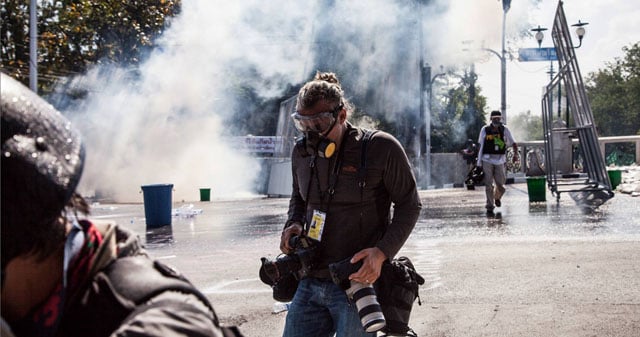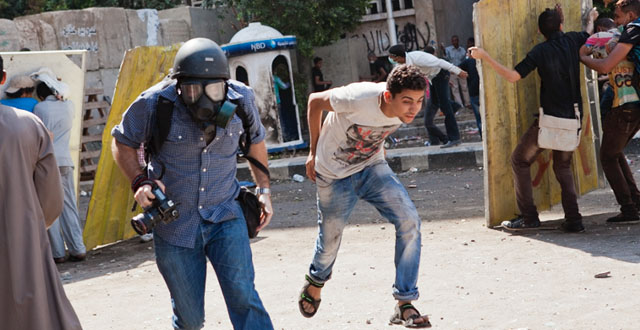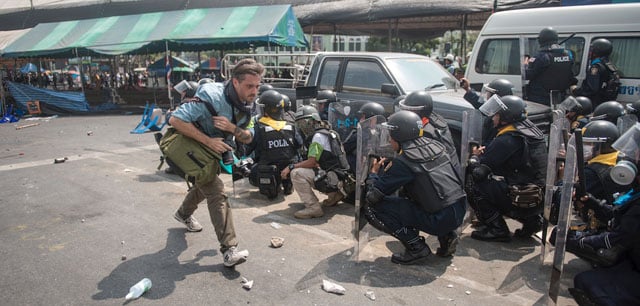Journalists Under Threat, From Within

Journalism is under threat from all sides. The last few years have been some of the most dangerous in history for journalists around the world; they have been killed, injured and detained in record numbers. But journalists are under threat from within as well, as some media companies seem content to eat their own.

Quality journalism costs money. Mr Hull suggests that only writing which isn’t paid for is ‘real’. But who IS paying for it if the outlet isn’t? Public perception of journalism and news media is that it is increasingly partisan and untrustworthy. Inviting unpaid content seems like an excellent way to invite special interests and lobbyists to speak their mind. Writers, photojournalists and videographers have rent and bills to pay and sometimes they might want to eat, or drink, or take a holiday.
The best way to ensure journalism is well researched and ethically sourced is for an outlet to pay the cost of reporting it, plus a fair rate for the journalist’s time. It is surprising that this even needs to be pointed out. When was the last time you saw chefs asking to be paid for the food you eat in a restaurant, or an electrician publicly begging for change for replacing your busted fuses?
At Frontline Freelance Register, we also believe that fair and timely pay is a safety issue. Our members work in some of the most dangerous parts of the world. The news industry, with its shrinking foreign bureaus and cut-backs, increasingly relies on our members and other brave journalists to bring news of what’s happening around the world into our living rooms and onto newspaper pages.

Reporting in war zones and areas of political or civil unrest and change is expensive. A good fixer, driver, hotels, insurance and safety equipment can run into the hundreds, or even thousands, per day. Someone has to pay this. Often, news organisations don’t cover expenses, or expect freelancers to cover them personally and then seek subsequent reimbursement. This can take months, as many news organisations classify journalists as vendors who fall under the same finance protocols as the photocopy company or the people who deliver the water-coolers.
When freelancers aren’t paid properly, they cut corners. Perhaps they try to work for several clients at once, or take a cheaper driver that’s not so trusted. Maybe they stay in the firing line longer, and closer, to sell more work to cover the expenses. Perhaps they don’t take out insurance because the cost would mean they don’t break even. A business model that requires journalists and local media workers, drivers and fixers, to bear the cost of producing news is not a business model at all.
The Huffington Post was acquired by AOL in 2011 for $315 million. Last year it was valued at $1 billion, due in no small part to the 200 million unique visitors it gets each month. But how many of those visitors understand that the news they read is generated at the expense of journalists?
Successful campaigns have meant consumers now worry about whether their eggs come from battery hens, whose lives are made miserable so suppliers can profit from cheap eggs. Fair-trade coffee is now pervasive because it was deemed unreasonable for workers to toil in the field for slave wages. Clothing producers are now held to account when their factories fall below the minimum standards of safety for workers. But with news, consumers have not yet caught onto the fact that the information they read is not always gathered ethically. That freelance journalists are sometimes exploited and imperiled. It is up to consumers to demand that the media they consume is gathered as ethically as their breakfast.
About the author: Emma Beals is a journalist, producer, writer, and photographer. This article was written for the Frontline Freelance Register (FFR), a representative body for international freelance journalists who take physical risks in their work. FFR is a member of the ACOS Alliance and a signatory of the Freelance Journalist Safety Principles. This article was also published here.